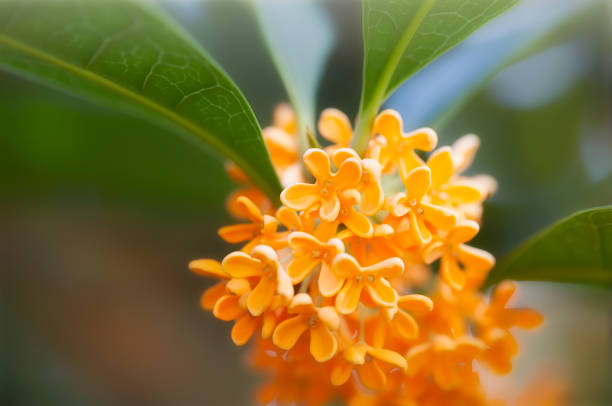
The Science Behind Osmanthus — A Golden Elixir for Calm and Anti-Aging
What are the benefits of Osmanthus?
Osmanthus (Osmanthus fragrans)—also known as sweet olive, fragrant olive, tea olive, and sweet osmanthus—has long been revered in Japan and China for its intoxicating aroma—a complex blend of apricot, honey, and gentle floral tones. The essential oil is derived from steam-distilling osmanthus blossoms, yielding a fragrance rich in ionones, a class of compounds responsible for its warm, fruity sweetness, and are known for their psychological benefits, such as reducing stress and improving mood by interacting with the limbic system—the part of the brain that regulates emotion and memory.
From a skincare perspective, osmanthus essential oil is gaining attention for its antioxidant and anti-inflammatory activity. Studies have identified compounds such as:
- 2-phenylethanol (an organic compound with the chemical formula C6H5CH2CH2OH),
- hexadecanoic acid (more commonly known as palmitic acid, is a saturated fatty acid with the chemical formula C16H32O2), and
- linoleic acid derivatives (oxidized compounds formed when LA is broken down by enzymes or reactive oxygen species)
that work synergistically to protect skin cells from oxidative damage and support collagen integrity. This makes osmanthus oil a gentle yet potent ingredient to help maintain a smooth and radiant complexion over time.
Moreover, osmanthus has been associated with calming properties that promote relaxation when inhaled, making it a natural choice for aromatherapy. The aroma has been observed to reduce cortisol levels and induce a state of calmness, helping alleviate both physical and emotional fatigue.
EXPLORE OUR LIMITED RELEASE—GILDED REVERIE OSMANTHUS PERFUME OIL
Main Notes: Osmanthus, Jasmine, Rose
Base: Organic Jojoba Oil
Supporting Florals: Jasmine and Rose
Jasmine essential oil

Extracted from Jasminum grandiflorum flowers, jasmine oil has long been praised for its romantic, uplifting aroma. Chemically, it contains benzyl acetate and linalool, which have been shown to exhibit mild sedative properties that can ease anxiety and tension. When applied topically, jasmine is known to support skin elasticity, improve moisture retention, and impart a luminous texture.
Safety notes: Gentle on skin when diluted, but it may trigger sensitivities in fragrance-sensitive individuals. Avoid direct exposure near pets, as jasmine may be toxic to cats in undiluted form.
Rose essential oil

Distilled from the petals of Rosa damascena, rose oil contains over 300 volatile compounds, most notably citronellol and geraniol. These compounds are natural antioxidants that can reduce environmental stress on skin and provide a sense of emotional well-being through olfactory stimulation.
Rose oil can also soothe minor redness and dryness due to its mild anti-inflammatory effects, making it an excellent complement to osmanthus.
Safety notes: Generally considered pregnancy-safe in low concentrations but should still be patch-tested.
Dermatologists Recommended: Organic Jojoba Oil Benefits

Organic jojoba oil (Simmondsia chinensis) stands apart as a liquid wax ester, structurally similar to human sebum. This similarity allows it to absorb effortlessly without leaving a greasy residue while also helping regulate sebum production for balanced, moisturized skin. Its composition—rich in tocopherols (vitamin E) and long-chain fatty acids—provides emollient and antioxidant protection that supports both the hair cuticle and skin barrier.
When blended with essential oils, jojoba acts as a stabilizer that prolongs the life of delicate aromas while enhancing absorption. For hair, it helps tame frizz, boosts shine, and maintains scalp comfort by soothing dryness.
Safety notes: Suitable for nearly all skin types, non-comedogenic, and safe for sensitive skin and pregnancy.
Ethical and Sensory Experience
GILDED REVERIE captures a balance between scientific formulation and botanical poetry. Each drop layers the sensual warmth of osmanthus with the timeless elegance of rose and jasmine, grounded by the silky smooth texture of organic jojoba oil. The result is a perfume oil that performs as an olfactory experience and a skin-loving treatment—inviting wearers into a serene sensory journey that blends emotion with evidence-based craftsmanship.
Recommended reference sources:
- Steven Kuan-Hua H. et al. (2023). Antioxidant, Anti-Inflammatory and Antiproliferative Effects of Osmanthus fragrans (Thunb.) Lour. Flower Extracts. Plants.
- Da Eun Jeong et al. (2020). Anti-inflammatory activity of phenylpropyl triterpenoids from Osmanthus fragrans var. aurantiacus leaves. International Immunopharmacology.
- Ouyang X. et al. (2015). Antioxidant activity and phytochemical composition of Osmanthus fragrans'pulps. South African Journal of Botany.
- Chien-Ya Hung, Yu-Cheng Tsai, & Kuo-Yu Li (2012). Phenolic Antioxidants Isolated from the Flowers of Osmanthus fragrans. MDPI.
- Sayowan W. et al. (2013). The Effects of Jasmine Oil Inhalation on Brain Wave Activities and Emotions. Journal of Health Research.
Mohebitabar S, Shirazi M, Bioos S, Rahimi R, Malekshahi F, Nejatbakhsh F. (2017). Therapeutic efficacy of rose oil: A comprehensive review of clinical evidence. Avicenna Journal of Phytomedicine. - Tietel Z. et al. (2024). Topical application of jojoba (Simmondsia chinensis L.) wax enhances the synthesis of pro-collagen III and hyaluronic acid and reduces inflammation in the ex-vivo human skin organ culture model. Frontiers in Pharmacology.

